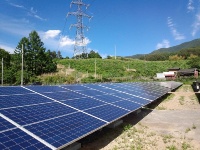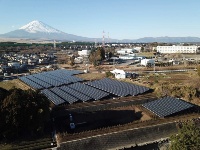Marubeni and Tokyu Fu switch from FIT solar power to FIP, FIP gains an advantage due to rising market

Nonmochi No. 1 and No. 2 power plants
(Source: Marubeni)

Re-Energy Shizuoka Kamiyama Solar Power Plant
(Source: Tokyu Land Corporation)
With the launch of the Feed-in Premium (FIP) system in April 2022, there have been cases where solar power plants that had been operated under the feed-in tariff (FIT) system have been switched to FIP. Due to the continued high price in the Japan Electric Power Exchange (JEPX) market, it is possible that switching to FIP, which sells electricity at the market price, may be more profitable, depending on the unit price of FIT electricity sales. in the background.
Marubeni and Tokyu Land each announced on November 11 that they would switch their group-owned FIT solar power plants to FIP.
Marubeni announced that it has expanded its renewable energy aggregation business and has started handling electricity using the FIP system through its wholly-owned subsidiaries Marubeni New Electric Power and Mibugawa Electric Power. Mibugawa Electric Power Co. owns in Ina City, Nagano Prefecture and converts a total of 1 MW of the Hiji No. 1 and No. 2 Power Plants, which sell electricity using FIT, to FIP application, and Marubeni New Electric Power Co., Ltd.'s renewable energy aggregation Promote it as one of our businesses.
At the same time, we will utilize the results obtained from the demonstration project that Marubeni New Electric Power is working on, such as high-precision power generation and power demand prediction using AI (artificial intelligence) and big data. Under the FIP system, power generation companies bear the cost and adjustment of the imbalance, which is the difference between the planned power generation value and the actual value. It is important to improve management capabilities.
The company explains that the current surge in electricity prices does not necessarily lead to an increase in electricity sales revenue. In addition, Marubeni wants to continue to utilize FIP to expand its renewable energy aggregation business, and Marubeni New Electric Power will consider using various FIP power sources, including external power sources, as well as within the group.
On the other hand, Tokyu Land Corporation announced that it has carried out the procedure to switch from FIT to FIP for four power plants, including the "Reene Shizuoka Kamiyama Solar Power Plant" in Gotemba City, Shizuoka Prefecture, totaling 2.65 MW, and received certification. From November 13th, the power plants that have completed the switchover will start supplying generated power to the company's facilities.
Until now, the company has used FIT non-fossil certificates with tracking. In the case of FIP, the environmental value remains with the power generation company, so there is also the advantage of not having to purchase a non-fossil certificate. In the future, we will utilize our strengths as a power generation company to use renewable energy generated in-house, and will promote the development of non-FIT power plants with additionality with a view to selling power to external parties.
Regarding the switch from FIT to FIP, under the current soaring market of the Japan Electric Power Exchange (JEPX), it is possible to secure profitability equal to or higher than FIT as a power generation business. In addition, as a retail electricity business, there is an advantage that it is not affected by market price fluctuations because it is a bilateral contract. As of the end of September 2022, we are developing 85 renewable energy projects nationwide, including those under development.






